Is Dropshipping Legit? How to Avoid Dropshipping Scams?
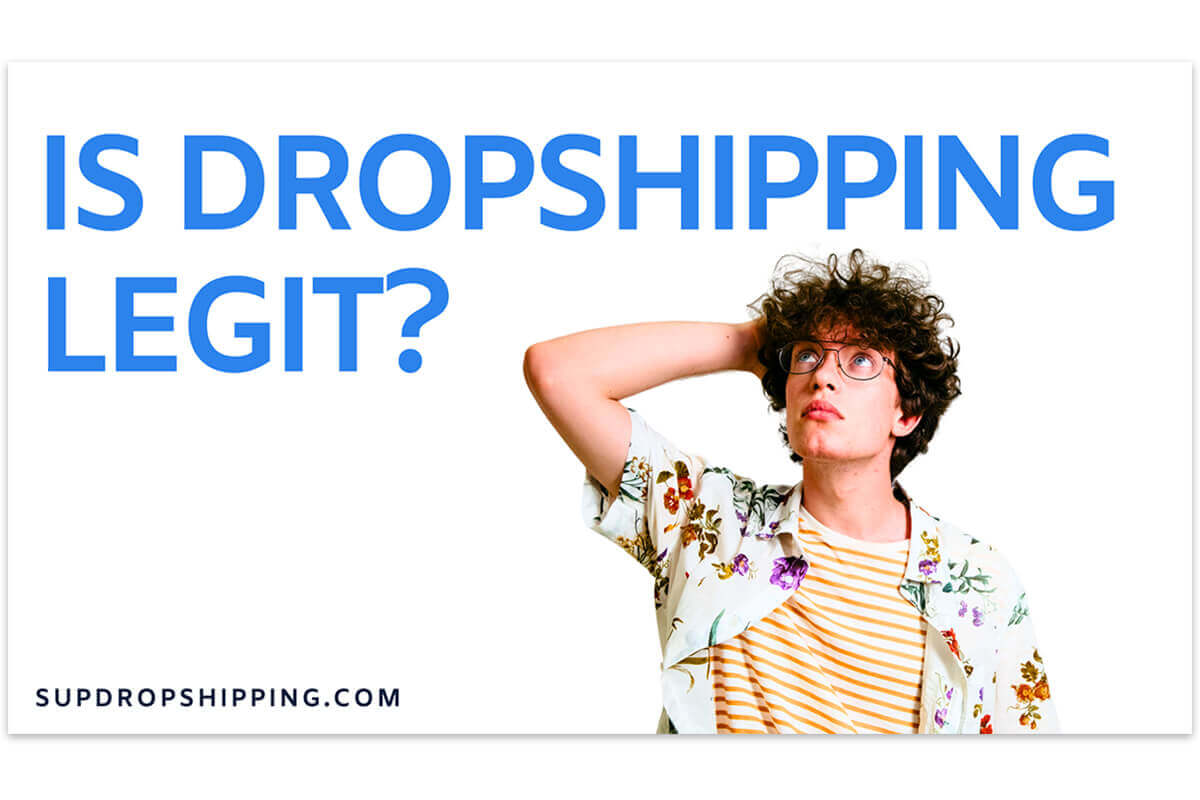
Have you ordered from an online store, and it was stated on their store profile that they were based in A? However, when you received your purchased product, the waybill address was from B and not A. Another instance is when you order from the “same” online store, but your products arrive separately and from different places. Looks sketchy. But then, you received all of your items safe and sound. This is likely because the online store you’re purchasing from follows a dropshipping model.
Dropshipping is a business model wherein you can sell your supplier’s products without purchasing them. And you can make agreements with different dropshipping suppliers so you can sell a variety of items. When a customer places an order at your dropshipping store, your suppliers will be the ones packing and shipping your customer’s orders. In case your customer orders different items from different suppliers, their items will arrive separately.
Because of the “convenience” the dropshipping model offers, several people ask, “Is dropshipping legit?”
Is Dropshipping Legit?
We can’t blame other people why they’re having doubts about dropshipping. How can someone start an online store without investing money in the products, plus they won’t deal with the hassle of packing and shipping?
But to answer the question, “Is dropshipping legit?” Yes, dropshipping is a legitimate type of business model. In fact, dropshipping is older than the internet. It has been around since the 1960s and 1970s. But it started to grow in popularity during the 1990s when the internet was invented.
Though dropshipping is a business model that existed even before the internet, it was only in 2010 that dropshipping underwent a revolution, mainly influenced by China. When Alibaba launched AliExpress in 2010, different countries worldwide were given the chance to access Chinese wholesalers, manufacturers, and suppliers who offer more affordable items than US-based dropshipping suppliers.
Whether your dropshipping suppliers are from China, the US, or other countries, it is important to remain cautious since there are various dropshipping scams.
Most Common Dropshipping Scams
If you’re interested in starting a dropshipping store, you should be aware of the most common dropshipping scams to avoid losing money. Like any other business, some people in the dropshipping industry intend to scam dropshippers, especially newbies. But if you’re geared with the proper knowledge, you can prevent yourself from getting scammed.
1. Deceiving and misleading product quality
One of the primary reasons people ask, “Is dropshipping legit?” is because some dropshipping suppliers offer products with deceiving and misleading quality.
An example of this dropshipping scam is when a dropshipping supplier showcases seemingly perfect images and videos of a particular product, let’s say, a stainless mixing bowl. They market the mixing bowl as genuine stainless steel, thick, and durable. They demonstrate its quality by sharing close-up shots of the product and even go to the extent of striking the item to highlight its durability.
However, upon purchasing the mixing bowl, customers discover it doesn’t meet its advertised specifications. The product is merely coated with glossy paint to create the appearance of stainless steel, and in reality, it’s thin and lacks the promised durability.
There’s nothing wrong with selling a low-quality product. However, any supplier or seller should be honest about an item’s features and quality.
How to avoid this dropshipping scam:
- Read product reviews. Before adding a specific item to your dropshipping store, check its product reviews on e-commerce platforms like Amazon, eBay, Etsy, Shein, Shopee, and Lazada. If there are more dissatisfied customers than happy ones, then you shouldn’t include the item in your dropshipping store.
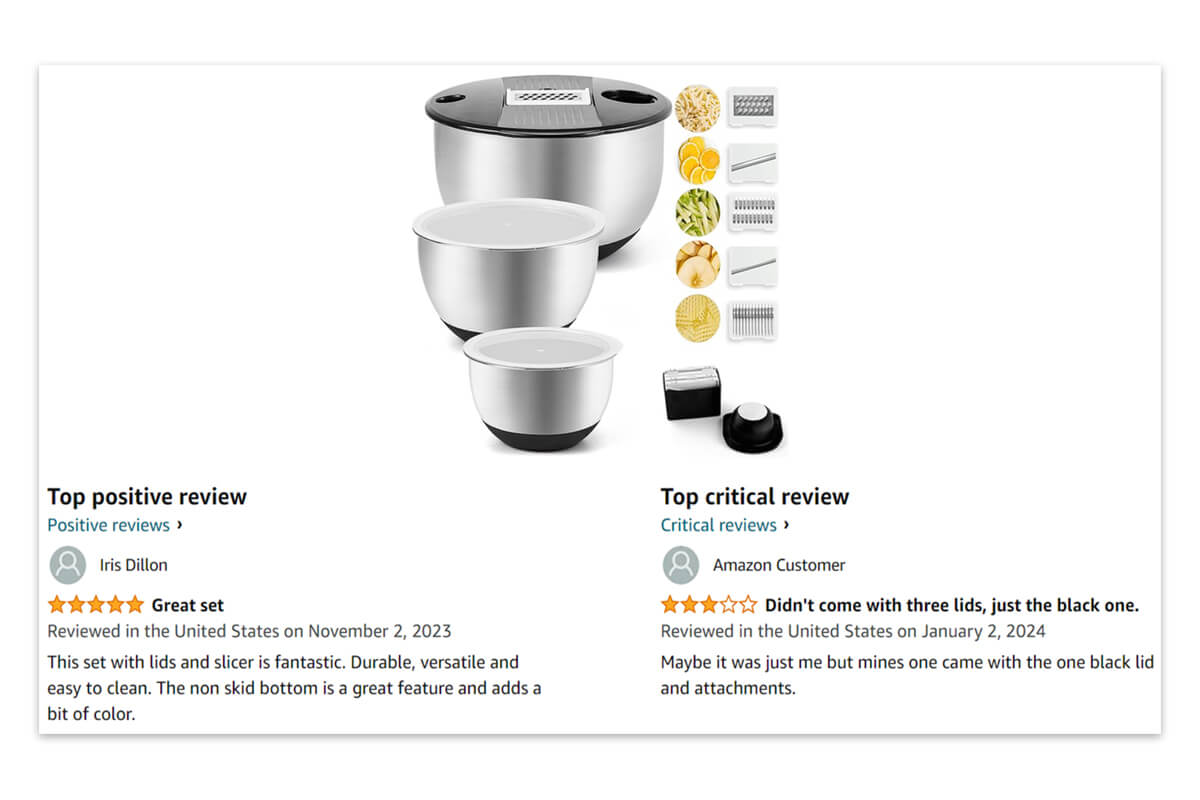
2. Check the price. Does the advertised product quality match its price? If it’s too good to be true, it might be a deceiving and misleading product sample. Remember, no high-quality product is too cheap.
3. Watch unboxing videos. Fortunately, today, there are vloggers who aim to debunk deceiving and misleading products with their unboxing videos–like this TikToker. He purchases trending products and tests them to see if what is shown in the product advertisements is real or not. He then rates each product he tries, helping buyers make well-informed purchasing decisions.
2. Counterfeit or imitation products
If you want to dropship branded goods, beware of dropshipping suppliers offering counterfeit or imitation products. Although some countries have lax regulations regarding fake goods, selling counterfeit items comes with legal consequences and damages the reputation of your dropshipping store.
Let’s say you’re marketing your products as authentic in the marketplace, and a customer purchases one of your items. That customer paid a hefty price for an “original” item only to find out that it’s fake. You’re lucky if the customer only wants to have a refund. But there are also customers who report stores that sell counterfeit goods—and you might end up paying fines or, worse, behind bars.
How to avoid this dropshipping scam:
- Read what other people say. To verify if the dropshipping supplier is selling authentic items, do a quick search of their company name on Google or social media. Anyone talking about them will appear on your feed. Do people speak positively about the authenticity and quality of their products? Or are there several people warning you not to buy their knockoff items?
- Check the price. Authentic items are always expensive. If a dropshipping supplier offers you the product at half the price, think. No dropshipping supplier will give bulk discounts to a dropshipper since you’re essentially a retailer and not a wholesaler.
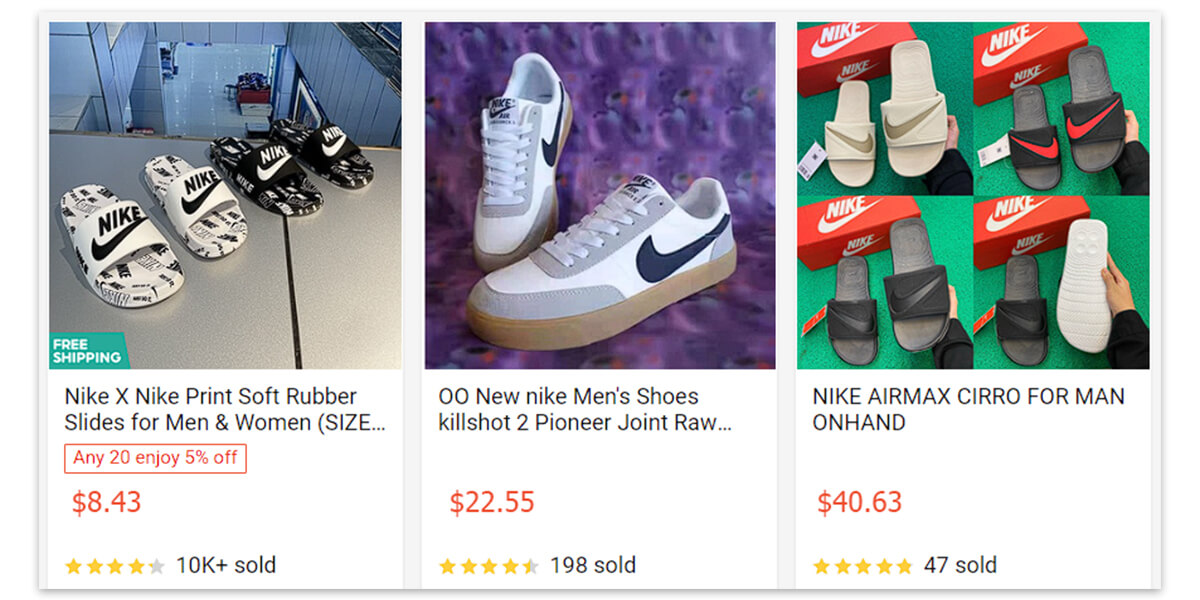
3. Buy product samples. If you want to be sure, you can buy product samples from the dropshipping supplier to personally assess whether the items are authentic. This is more feasible if you own a genuine product to use as a comparison.
3. Fake product reviews
What? Even reviews can be faked? Unfortunately, they can. Some dropshipping suppliers are desperate to make sales, so they make their own reviews. If the dropshipping supplier has a website, they can simply create dummy accounts, grab a random photo of a person in stock photo websites, invent a name, and write a positive review about the product.
People are usually encouraged to pick a product after seeing several positive reviews. And some dropshipping suppliers are good at faking those. If you don’t want to be a victim of their schemes, here are some tips to avoid this dropshipping scam.
How to avoid this dropshipping scam:
- Check the dates of the product reviews. Some dropshipping suppliers overlook a crucial detail when fabricating product reviews. And that is, they often post product reviews on the same day, nearly simultaneously—because that is their “task” for the day. For example, one review has a timestamp of “1/26/2024, 8:00 am,” followed by another at “1/26/2024, 8:05 am,” and another at “1/26/2024, 8:10 am,” and so forth. Such simultaneous timestamps strongly suggest the likelihood of these reviews being fake.
- Read how they construct their reviews. Do the product reviews seem overly positive and too general? Do they also sound unnatural? Real product reviews written by actual customers often highlight what they like or dislike about the product. Therefore, if the reviews on every product page of your prospective dropshipping supplier are almost always the same, they’re likely fake.
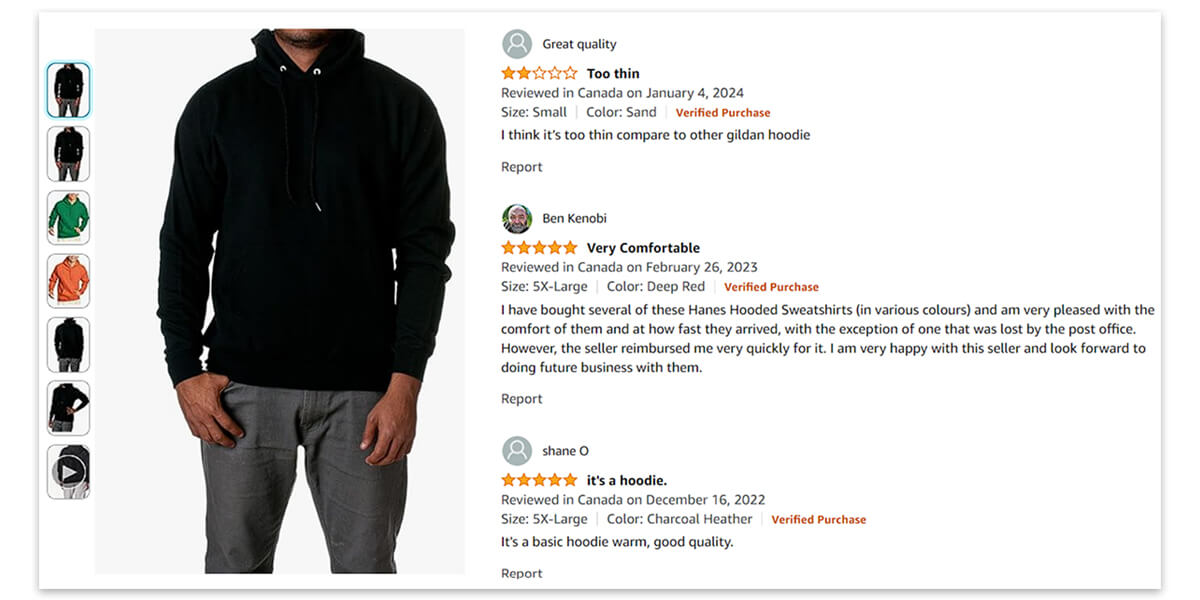
3. Check the product photos and videos. Most e-commerce websites and platforms allow customers to attach images and videos of their purchased items. Do the posted product photos and videos match the product? If not, the review may just be fabricated.
4. Watch video product reviews. While written and video reviews can be faked, unreliable dropshipping suppliers tend to fake written product reviews more frequently. Why? Because generating fake video reviews takes too much time and effort.
4. Fake dropshipping suppliers
Some people want easy money, so they pose as dropshipping suppliers. This is why some people ask, “Is dropshipping legit?” because of the widespread presence of scammers in the industry.
Fake dropshipping suppliers usually earn by accepting payments from your customers, but they never ship the products. As the owner of the dropshipping store, you must use your own funds to issue refunds to your customers. Meanwhile, other fake dropshipping suppliers earn money by collecting your personal info and selling your data for malicious purposes.
How to avoid this dropshipping scam:
- Research the dropshipping supplier. Check your dropshipping supplier’s credibility and reputation by visiting their website and social media accounts. Most legitimate dropshipping suppliers have an online presence. You can also assess how they post and interact with their customers online. Additionally, check for their physical address and contact details to verify their authenticity. If they don’t have any digital footprint, reconsider before you make transactions with them.
- Read reviews about them. Are there several people vetting your prospective dropshipping supplier? Visit different platforms to learn more about them, such as online marketplaces, specialized review websites, forums, social media, and blogs.
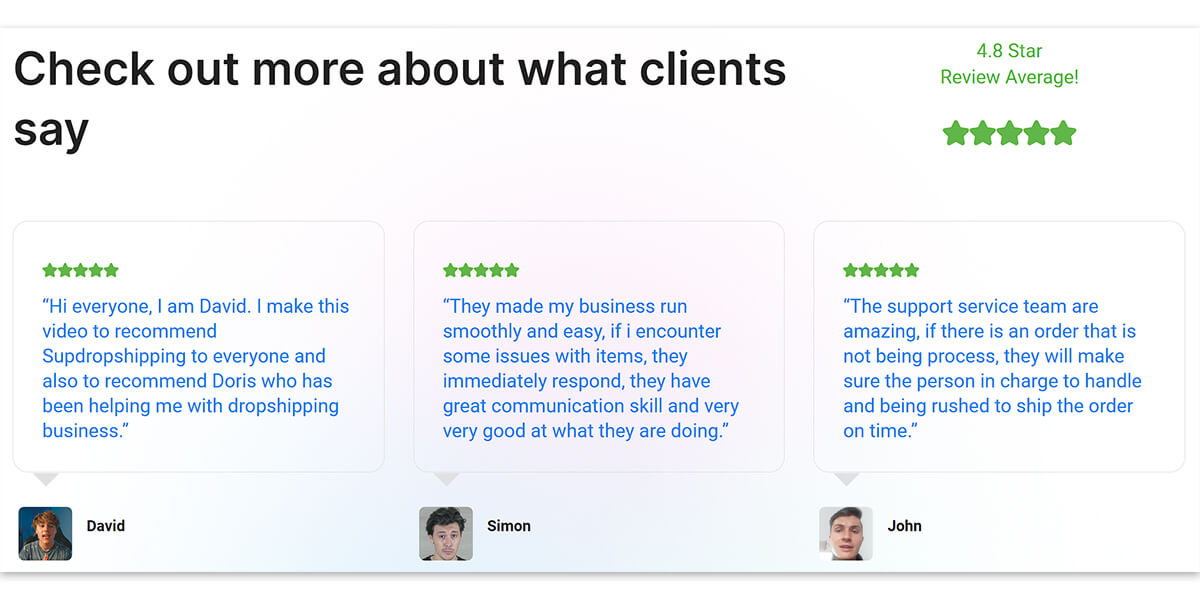
3. Communicate with them. Talking with your prospective dropshipping supplier gives you a sense of whether they’re legit or not. If they seem like they’re pressuring you to partner with them, they may have hidden agendas.
5. Lots of hidden fees
Dropshipping is an enticing business model for people who don’t have much capital. But among the things that drive people away from adopting this business model is that there are a lot of hidden fees—all because some dropshipping suppliers are not being upfront about them.
Examples of hidden fees in dropshipping are membership fees, order processing fees, packaging fees, customs and import fees, restocking fees, and more. People are more than willing to pay these fees if the dropshipping suppliers are transparent. But anything not discussed with the dropshipper before finalizing the deal is a scam.
How to avoid this dropshipping scam:
- Always ask questions. Before you sign an agreement with your dropshipping supplier, always ask what you want to know. We recommend that you list all the questions you have in mind, especially the fees associated with each transaction.
- Read the supplied documents. Some dropshipping suppliers don’t have enough time to explain every detail. But to remedy this, they provide documents to read or send you a link to find their dropshipping terms and conditions. So, as a responsible dropshipper, do your part to read all of them so you won’t be surprised by hidden fees.
6. Underdelivering dropshipping sales agents
It’s quite frustrating when businesses promise excellent after-sales support but don’t. They constantly pester you to buy their products or services, but after they get what they want from you, they just vanish or underdeliver. And sadly, this also occurs in the dropshipping industry.
There are dropshipping sales agents who fail to honor agreements, deliver poor customer service, and become inconsistent in communication. Though this isn’t entirely a dropshipping scam, broken promises and agreements are deceptive and are a form of scam.
How to avoid this dropshipping scam:
- Read the agent’s profile. Dropshipping suppliers usually have a team of agents. And sometimes, each agent has their own profile page on the dropshipping supplier’s website. Carefully review each agent’s profile and request a reliable agent from your dropshipping supplier to guide you in your dropshipping business.
- Read reviews. Happy dropshippers usually leave a review on the dropshipping supplier’s website or social media platforms. They often indicate the agent’s name who has helped them in their dropshipping business. List the names of the mentioned agents and ask your dropshipping supplier whether any of those agents can support you in your dropshipping business.
Frequently Asked Questions (FAQs)
1. Is dropshipping legit?
Dropshipping is a legitimate business model. It has existed since the 1960s, but it only grew in popularity with the availability of the internet in the 1990s.
2. Why do people think dropshipping is a scam?
Some people think dropshipping is a scam because they lack the knowledge about it. Anything you don’t know makes you feel doubtful about it, not just dropshipping. Of course, like any other business, you may also encounter dropshipping scams and lose money, especially if you don’t do your own research and remain vigilant.
3. What are the most common dropshipping scams?
The most common dropshipping scams include deceiving product quality, imitation products, fabricated product reviews, fake dropshipping suppliers, hidden fees, underdelivering dropshipping sales agents, and more.
4. How can I find a reliable dropshipping supplier?
You can do simple internet research and list dropshipping suppliers who are frequently recommended. You can also join dropshipping groups and communities and ask the members about their vetted dropshipping suppliers.
Summary
Rest assured, dropshipping is a legitimate business model. But before you start your dropshipping business, always do your research to avoid dropshipping scams. One of the keys to a successful and worry-free dropshipping biz is to find a credible dropshipping supplier like Sup Dropshipping.
Sup Dropshipping has been around since 2010, and we have happy dropshippers from all over the world, such as the US, UK, and more. You can watch our dropshippers’ video testimonials here. What sets us apart from other dropshipping suppliers is that we have dedicated dropshipping software that you can integrate into your dropshipping store, providing a seamless order fulfillment operation. And the best part is, you can use it for free! If you want to unlock all of our service features, you can avail premium. Check our pricing here. Moreover, we have a team of reliable dropshipping agents who can assist you in your dropshipping business.
Want to learn more about our dropshipping services? Contact us today!
About the Author

Jack Han
Jack is a SEO manager and blog writer at Sup Dropshipping. He holds an MA in Linguistics and Education. He has over 10 years experience in E-commerce, and 5 years of experience in SEO. Jack is an enthusiast to share his recent knowledge learnt from peer experts in the industry.
One response to “Is Dropshipping Legit? How to Avoid Dropshipping Scams?”
-
Faraz khan my shop name

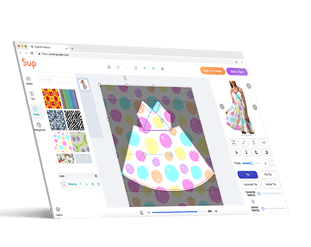
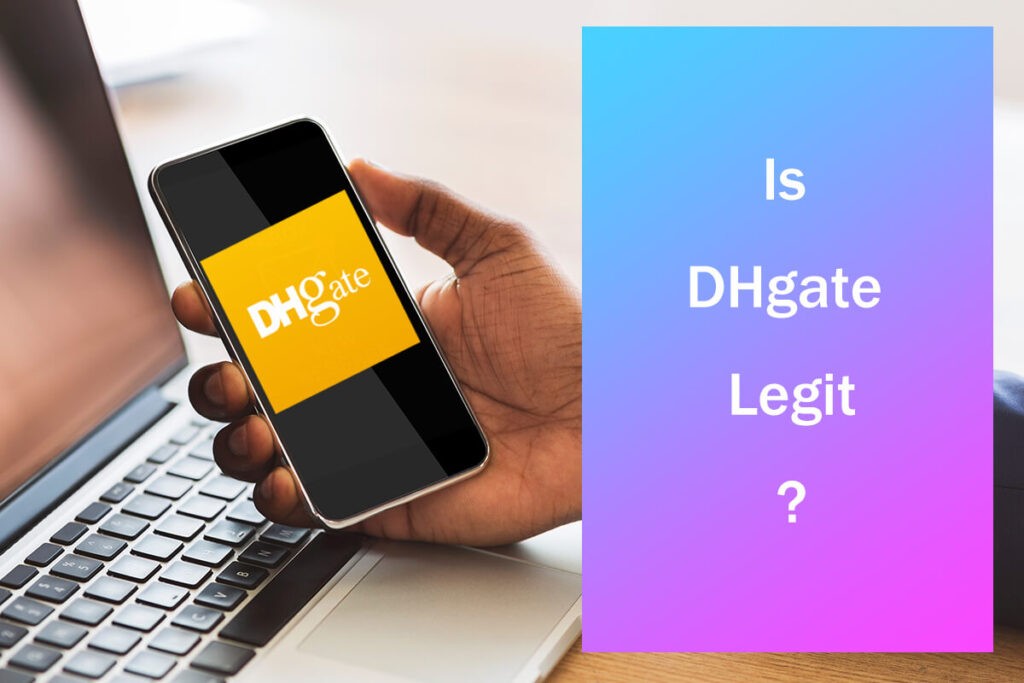
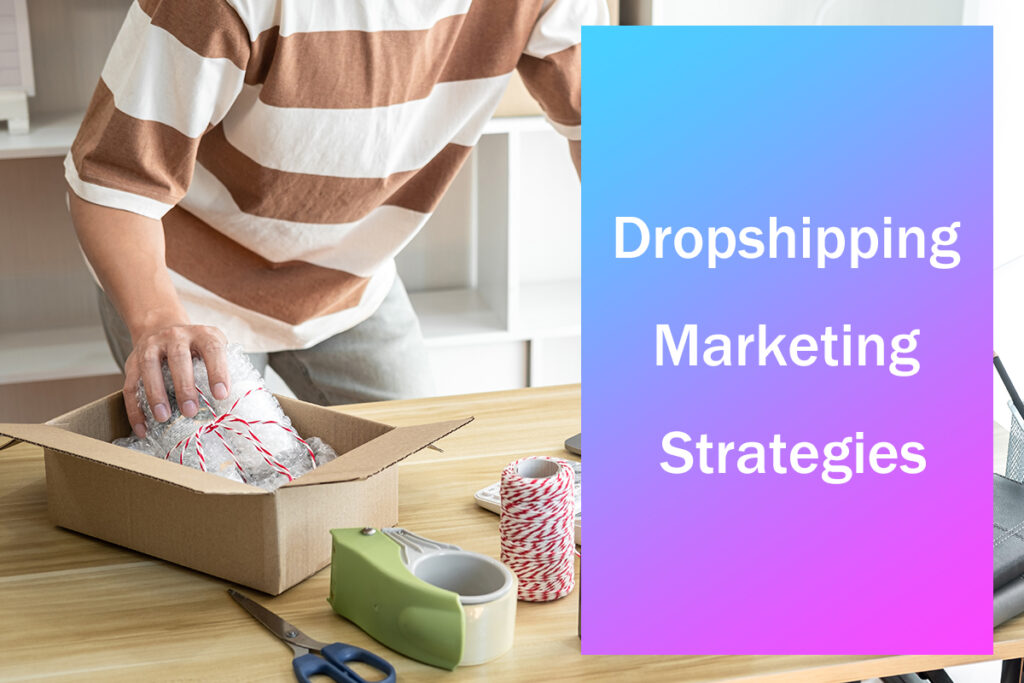

Leave a Reply